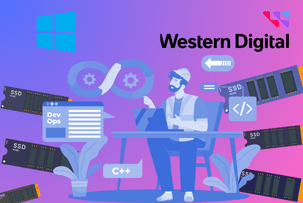PathNet and HostZealot: Ultimate DDoS protection
14:10, 23.02.2024
In today's digitally driven world, the threat of Distributed Denial of Service (DDoS) attacks looms large over online businesses. Despite advancements in cybersecurity, these attacks continue to pose a significant risk in 2024 as well, with the potential to disrupt services, cause financial losses, and damage reputations.
With DDoS attacks increasing in size and power, businesses must adopt proactive defense strategies to mitigate the risk. This includes implementing robust network security measures, such as DDoS mitigation solutions, firewalls, and intrusion detection systems. Additionally, businesses should conduct regular risk assessments, educate employees about cybersecurity best practices, and establish incident response plans to minimize the impact of potential attacks.
DDoS: A rising threat
During a DDoS attack, the threat actor attempts to overload a target network with a large volume of traffic from different sources. The aim is to prevent outcoming traffic from leaving the network. A DDoS attack can lead to lengthy downtime, lasting anywhere from hours to days.
The consequences of a successful DDoS attack can be severe for online businesses. Beyond the immediate disruption of services, businesses may suffer financial losses due to downtime, reduced productivity, and damage to their brand reputation. Furthermore, regulatory compliance requirements may impose penalties on businesses that fail to adequately protect against DDoS attacks, adding another layer of risk.
DDoS isn’t a new threat, but it’s something that network security teams must increasingly protect against. According to Path.net DDoS and Network Security team, large-scale volumetric attacks are growing faster than ever and putting companies at risk for costly downtime. Attacks are also becoming more complex. It is not a matter of if but rather a matter of when you will be the target of a DDoS.
Path.net: A DDoS mitigation pioneer
To defend against DDoS attacks, many businesses turn to on-premise hardware appliances or proprietary solutions to confine traffic within their network. While initially effective, this method encounters challenges as cyber threats evolve. Traditional hardware-based DDoS solutions are limited by their processing and filtering capabilities, leaving them vulnerable to overwhelming large or intricate attacks. Consequently, organizations may find themselves continually investing in infrastructure to bolster their defenses without knowing if it is ever enough or if they will ever use it.
The common downside of on-premise DDoS protection solutions is that they have a set maximum capacity upon extension which a DDoS attack succeeds and manages to damage the performance of your server. From this perspective, if the organization sticks to on-premise solutions, it may face the need to continuously improve its defenses which eventually may still end up being insufficient at some point. This is the point where cloud-based DDoS protection like the one offered by Path Network comes into play. Such solutions offer a network of globally distributed scrubbing facilities that will provide successful DDoS protection in practically any DDoS attack scenario.
Path.net offers a unique DDoS mitigation strategy that integrates advanced traffic blocking and filtering, leveraging open-source eXpress Data Path (XDP) technology and deploying a globally distributed stateful firewall boasting a capacity of 12 Tbps across 20 active points of presence (PoPs) — this would be more than enough to manage today's sizable volumetric attacks. Furthermore, customers have the flexibility to tailor their DDoS security profile by implementing advanced traffic filtering adapted to their specific requirements.
A closer look at Path.net’s three-layer approach:
- Layer 1: Automatic blocking and filtering for volumetric and especially UDP-based DDoS attacks used in over 80% of the cases. Path Network uses adaptive filtering to efficiently mitigate volumetric DDoS and also to avoid blocking clean traffic
- Layer 2: A global stateful firewall with proprietary hole-punching technology that empowers the customer to control what traffic is allowed into his network based on the company’s specific needs. For example, the Customers can block, whitelist, or rate limit traffic based on source and destination network (IP subnet of any size), ASN, and based on traffic protocol. Customers can use this tool to open only the ports that must be opened for a specific application running behind a certain IP subnet. The focus is on identifying the clean traffic and allowing it into the network.
- Layer 3: XDP technology, with low-latency DDoS filtering. Traffic filtering takes place in the Linux kernel, bypassing the traditional network stack. Path is also using this technology to build custom DDoS filters for specific applications that are more sensitive and can’t be protected with generic filtering. XDP is efficient for use cases like VPN servers, DNS server filtering, VoIP, the most popular game servers, and web services that require custom filters.
Path.net aims to excel in customization by empowering enterprises to tailor and safeguard their digital environments with exceptional precision and granularity.
Path.net and HostZealot: A growing partnership
HostZealots DDoS protection is transparent and straightforward. While many providers, while offering DDoS protection, do not specify any details on the exact features of the DDoS protection solution, so you can’t even guess whether the protection is present at all, we share everything you need to know about the level of your server protection. In particular:
- Handling loads up to 400 Gbps: The gravity of a DDoS attack can be generally expressed in the number of Gbps. Conversely, any DDoS protection offer is designed to counteract a DDoS attack of a certain maximum capacity. A 400 Gbps protection is capable of handling up to 400 Gbps of malicious traffic. In contrast, regular legitimate traffic can reach the targetted server or network regardless of the scale of the DDoS attack.
- No charges for dirty traffic: DDoS attacks won’t affect your bandwidth bills. If you’ve chosen a server with 100 Mbps of bandwidth, these 100 Mbps will only count for the clean traffic, excluding the dirty traffic associated with DDoS attacks. If having opted for a server with 100 Mbps, you’ve been attacked with 1Gbit, the attack won’t affect your billing in terms of bandwidth.
- L3, L4 protection: Different types of DDoS attacks are distinguished particularly according to the layers of your network infrastructure that they attempt to hit. We offer DDoS protection on all relevant layers, including Layer 3 and 4.
Layer 3 refers to the network layer protection, also known as the Internet Protocol of IP layer, and it’s responsible for routing packets of data between different devices on a network.
Layer 4 in turn refers to transport layer protection, with the transport layer managing the end-to-end communication and ensuring that data is delivered reliably and accurately between devices. - Hybrid protection on hardware and software levels: As there are different types of DDoS attacks, comprehensive DDoS protection mitigates DDoS attacks on different levels. Hybrid protection refers to the combination of local and cloud-based DDoS protection solutions. Local protection comprehends a variety of software solutions as well as special devices.
Cloud-based protection refers to protection software that runs on external servers or in the cloud. Their strong side consists in the fact that they are not vulnerable to cyberattacks on your server, which provides for continuous operation regardless of circumstances.
To sum up, with the DDoS protection of HostZealot, all the traffic that goes to your server passes software and hardware-based filters that detect potentially harmful “dirty” traffic and let in the clean traffic. The mitigation capacity extends up to 400Gbps and dirty traffic won’t make you charge more for bandwidth. This is all you need to know about HostZealot DDoS-protected servers, and as you can see, we offer transparent comprehensive protection against virtually any type of DDoS attacks known up to the day.


